
views
Give them unconditional love.
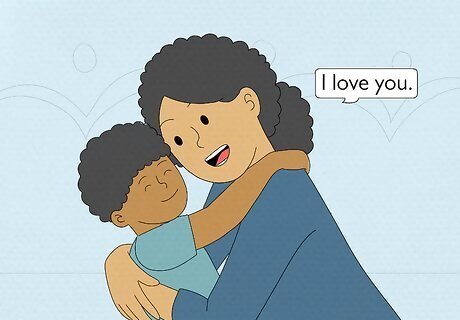
Feeling loved and accepted is crucial in building confidence. Kids who are the most confident in themselves know that they have family and friends who love them dearly and will always be there to support them. In order to help build your own child’s confidence, do things to show them your unconditional love. For example: Tell them you love them as often as possible. Make time for one-on-one conversations. Ask them how their day was, their feelings, or what they’re thinking about. Do fun activities together, such as cooking, playing games, or spending time playing outside.
Help them learn new skills.
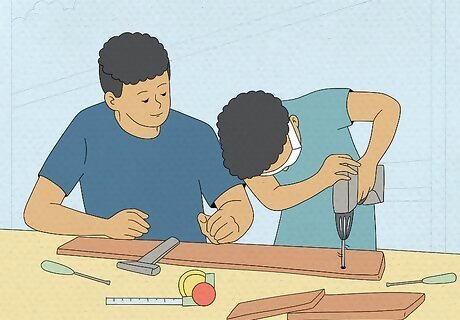
Kids become confident when they learn how to do new things. When kids learn a new skill, they feel a sense of accomplishment and pride in themselves. Help nurture these feelings by introducing your child to new experiences and teaching them new skills that are appropriate for their age. Also, be sure to model the skill for them first, then let them try it on their own. For example: Sign them up for fun classes that they might like, such as dance, martial arts, music, or sports. Help them to learn basic life skills so they can feel more independent, such as getting dressed, making breakfast, and learning how to read. Encourage them to attempt solving new puzzles or problems in school and work with them to come up with the answers. Children with low self-esteem may give up on learning something new rather quickly. In order to avoid such behavior, provide your child with lots of encouragement and support so that they feel confident in their abilities.
Set realistic goals.

Kids feel more confident when they’re given specific directions. Knowing what they’re supposed to do and being given specific directions can help kids feel more confident in their actions. To help them with this, come up with specific and realistic goals for your child. After you’ve come up with some goals together, be sure to guide your child and give them the help they may need to accomplish these goals. For example, to help your child feel more confident in their reading skills, make it a goal for them to read one chapter of a chapter book each night. To improve their confidence in school and speaking in front of others, make it a goal for them to ask their teacher one question each day. Make it a goal for them to be able to cook one meal on their own and help them learn the recipe. A child may feel less confident if they’re frequently not able to reach the goals they set, so be sure to set goals that are appropriate for their age and skill level.
Spend one-on-one time together.

Giving a child your attention makes them feel loved and confident. A child’s confidence grows when they feel loved and accepted by you, and showing them that they’re an important person deserving of attention can do wonders for their self-esteem. To show them your love, set aside time just for them, and be sure to give them your undivided attention so they know that they’re a priority in your life. For example: Spend your mornings together before you go to work by playing games, eating breakfast together, or reading a book together. When your child comes home from school, ask them about their day and listen attentively to their stories. Sign up for fun activities you and your child can do together, such as cooking, painting, or dancing. If you’re a teacher, make an effort to talk to each child individually at some point.
Allow them to take the lead during playtime.

Children learn to feel confident when they get to lead others. Confident people are often very assertive and aren’t afraid to take the lead. Help build up your child’s confidence by allowing them to take the reins when you play together. Allow them to decide what activities you’re going to do and let them give you directions to encourage their creativity and raise their self-esteem. On the other hand, children with low self-esteem and low levels of confidence may have a harder time asserting themselves and may not be as willing to take risks or voice their opinions.
Let them make decisions.

Knowing that their opinion matters helps build a child’s confidence. A kid’s confidence grows when they feel like their input and opinions are accepted by others. Allowing them to help make decisions can also help them feel proud and like they’re making an important contribution. It also shows that you trust their opinion. Whenever you get the opportunity, ask your child to help with age-appropriate decisions, such as: What to cook for dinner What movie to watch What outfit they want to wear What order they want to do certain activities in Where they want to go on vacation
Give them chores and other tasks.

Kids feel confident when they get to help others. Giving your child age-appropriate tasks to do gives them responsibility and shows that you trust them to finish the tasks successfully. Allow them to help around the house, at your work, or in the classroom as often as possible. Even the smallest tasks can help a child feel very accomplished and proud of themselves. For example: Let them help wash the dishes when you’re done eating. If you’re a teacher, ask them to help take attendance in class. Encourage them to pick up their toys and organize them how they want. Allow them to help care for a family or class pet, such as feeding it and playing with it.
Encourage them to help others.
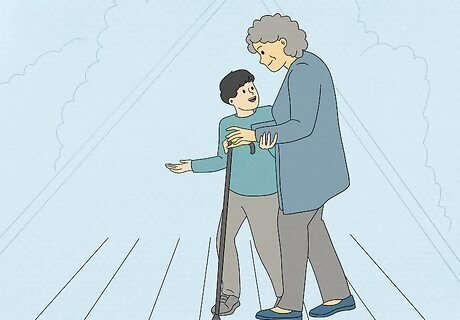
Providing for others helps children feel appreciated. When kids are given the opportunity to help others and be involved in their community, their sense of belonging and self-worth grow alongside their confidence. Encourage your child to do activities that center around helping others and their greater community. This is also a great way for them to make friends and be more socially active. For example: Sign them up for Girl Scouts or Boy Scouts. Volunteer with a community group. Participate in fun community events, such as a charity walk or food drive.
Model what confidence is meant to look like.
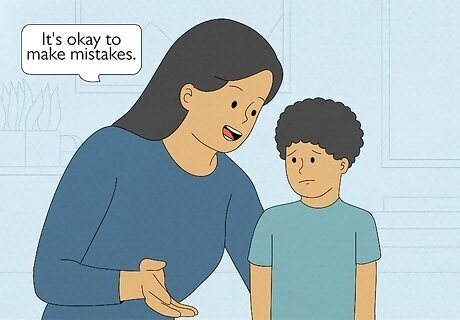
Children become confident when they have confident role models. It’s important to remember that kids often reflect and copy the attitudes and actions of their parents and other people in their lives. If you’re able to show them that you’re confident in yourself, they’ll learn to copy your behaviors and strengthen their own confidence and self-esteem. One way to demonstrate confidence is to show your child that it’s okay to make mistakes. Instead of getting frustrated in front of your child, show them how you accept your mistakes and talk them through what you learned. Be positive around your child. If you’re overly negative and pessimistic, your child might replicate those thoughts and be less confident in themselves and their decisions.
Praise their effort rather than their achievements.
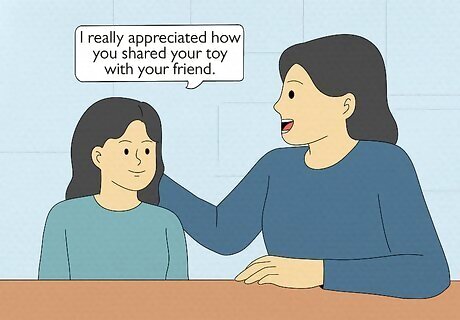
Focusing on progress rather than achievement helps build confidence. If you only praise a child when they do something well or accomplish something, they may actually feel less confident in themselves and be harsher on themselves when they fail. On the other hand, praising a child’s effort and progress gives them the confidence to keep trying and be proud of themselves even if they “fail.” Point out specific examples of how your child has made progress and grown. For example, if you’re a teacher trying to build up a student’s confidence in reading, show them how much more they’ve read by the end of the year compared to the beginning of the year. Give specific positive feedback rather than generic or vague praise. For example, instead of just saying, “Good job,” say, “I really appreciated how you shared your toy with your friend.”
Encourage them to express their emotions.
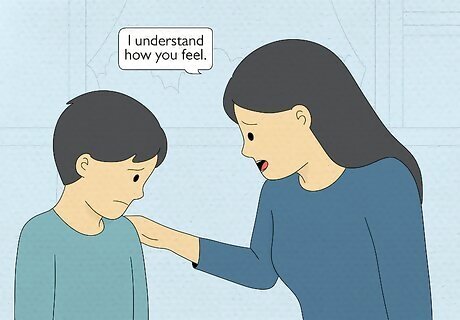
Kids feel confident when they can openly express how they’re feeling. When you encourage your child to be themselves and express themselves freely, their confidence and self-esteem grow. Be there to listen to them whenever they want to talk and validate their feelings. If they know that you’re taking their feelings seriously, they’ll feel more confident in expressing themselves even more in the future. Be a listener rather than trying to instruct them about how they should feel. Do your best to see the situation from their perspective and tell them that you understand how they feel to encourage them to share. If a child is feeling upset, ask them to talk through exactly how they’re feeling and what caused those feelings. Encouraging them to work through their frustration can help them strengthen their ability to express themselves and communicate better. Neglecting a child’s emotional needs can cause them to severely lack confidence and might cause them to believe that they can’t be open about their thoughts and feelings.
Help them find solutions to fix their mistakes.

Help them reframe failure as an opportunity for growth. Kids with low levels of confidence often overly fixate on their mistakes and failures, thus becoming less willing to take more risks in the future. In order to build up your child’s confidence, teach them to learn from their mistakes and remind them that it’s okay to fail. Being accepting of failure will make them even more confident to go out and try new things. Be sure to offer them verbal encouragement when they make a mistake or fail. Say things like, “That’s okay! How about you try one more time?” or “You did so well. I know you’ll do even better next time.” Be mindful of your words and tone when your child makes a mistake. For example, if they didn’t do well on a test, avoid being too harsh and asking something like, “Why did you get a C?” Instead, reassure them that you’re still proud of them and work together to come up with strategies to do even better next time.
Avoid criticism and negative talk.

Negative talk can chip away at a child’s confidence. The way you talk to a child can seriously impact how they come to view themselves. If you often use a lot of negative, critical, or sarcastic language, your child may internalize all of that and end up being very critical of themselves. To avoid this, use positive language to praise your child’s accomplishments and offer them reassurance when they need it. When kids misbehave, point out the behavior that you’re displeased with rather than telling them that they’re a bad child. This will help them correct the behavior while also making sure that they don’t come to have an overall negative perception of themselves. For example, avoid saying, “I’m so disappointed in you,” and instead say, “I didn’t appreciate how you talked back to me.” Avoid comparing your child to others, as this can make them feel like they’re not as good as others.
Show off their creations and other accomplishments.

Displaying a child’s work for others to see helps build confidence. Nothing makes a child feel more confident in themselves and their abilities than having their work displayed proudly at home or in school. If they’re proud of a picture they drew, be sure to pin it up on your fridge or at the front of the classroom. If they won a trophy, put it on a shelf where it’s visible to everyone. Overall, do what you can to show them how proud you are of their achievements. Displaying your child’s creations and achievements also encourages them to continue being creative and give their best effort. If you have multiple children or students, be sure to show off everyone’s accomplishments equally so that everyone receives praise and encouragement.
Let them spend plenty of time with friends.

Developing good social skills is key to building confidence. Socializing is crucial in helping a child build up their self-esteem and confidence. When they get the opportunity to play with and interact with other children, or even adults, they naturally start to develop their communication and interpersonal skills, both of which can lead to a more confident attitude. Plan playdates for your child so that they get plenty of time to socialize with their friends and other children. Provide them with plenty of opportunities to make new friends as well. Sign them up for classes at your local park district, take them to the park and encourage them to play with other children, or throw them a birthday party and invite all the kids in their class. If you’re a teacher, create opportunities during class that encourage students to be social with one another, such as group projects.
Talk to them about their interests.
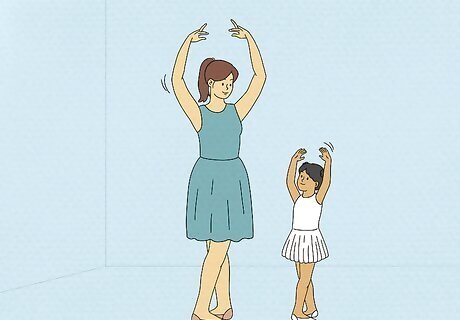
Children feel confident when you show interest in their passions. Nothing can make a child feel more excited and confident in themselves than when you and others show genuine interest in the things that they like. Whenever you get the chance, ask them about their interests and encourage them to share their passions with you. Some children may feel insecure about what they like, but if you show them that you’re accepting and supportive, their confidence will bloom. Provide them with tools and materials that will encourage them to pursue their interests. For example, if they really like animals, gift them with an encyclopedia about all the different types of animals. Or, if they are showing an interest in dance, sign them up for a dance class to see how they like it. For teachers, do your best to incorporate your students’ interests into your lessons so that they feel more confident and excited about learning.
Spend lots of time together as a family.
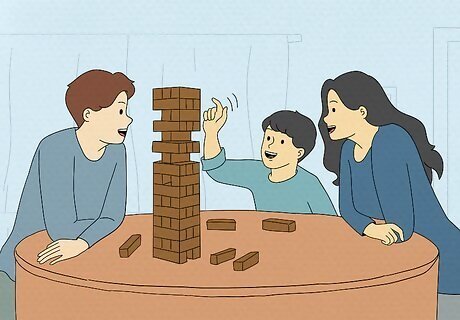
Pride in one’s family helps build up confidence. Knowing that they have a loving, supportive, and encouraging family behind them can do wonders in helping to strengthen a child’s confidence in themselves. When you work to build close family relationships, you’re helping your child feel included and appreciated. On top of that, show your child how much pride you have in your family so that they can grow up feeling proud and confident as well. Create a healthy family environment by encouraging everyone to share their opinions, listening attentively when anyone has concerns or worries, and avoiding critical or negative language. Instill a sense of pride in your child about your family by having them participate in family traditions. For teachers, do projects centered around having your students celebrate their family heritages, such as drawing family trees.
Let them take risks even if they fail.

Confident children aren’t afraid to step out of their comfort zone. One trait of kids with low self-esteem is a reluctance to experience new things or try new skills out of fear that they’ll fail or embarrass themselves. In order to build up your child’s confidence, encourage them from a young age to try new things even if it scares them or they don’t succeed right away. If you reward their courage, even if they fail the first few times, their confidence and self-esteem will skyrocket. For example, encourage them to try a new sport, learn an instrument, or start a new craft even if they’re unsure at first. Stick close by to help your child if they need it, but also be sure to let them have a bit of independence when trying something new. This will help them feel even more accomplished and confident in the end.
Teach them how to talk to themselves positively.

Positive self-talk helps kids raise their self-esteem. A child’s confidence not only grows because of the positive things other people say but also because of the good things they say to themselves. Teach your child how to think positively about themselves and replace any negative thoughts with more optimistic ones. For example, instead of saying, “I can’t do this,” encourage them to think more along the lines of, “If I keep practicing, I’ll be able to do this in no time.” Encourage them to think about things they’re grateful for to help them develop a more positive mindset. For example, have them list 3 things each day that they’re grateful for.
Shower them in physical affection.

Physical affection helps a child feel safe and loved. Hugs, kisses, and cuddles are all ways to show your child that you love them dearly and that they’re a very important part of your life. Such physical affection reaffirms their sense of security in their relationships and can help them feel more confident. Even holding their hand when you’re crossing the street can speak volumes and is just one small action that can make them feel protected and loved. Make sure that you’re keeping any displays of physical affection appropriate, especially if you’re a teacher.


















Comments
0 comment